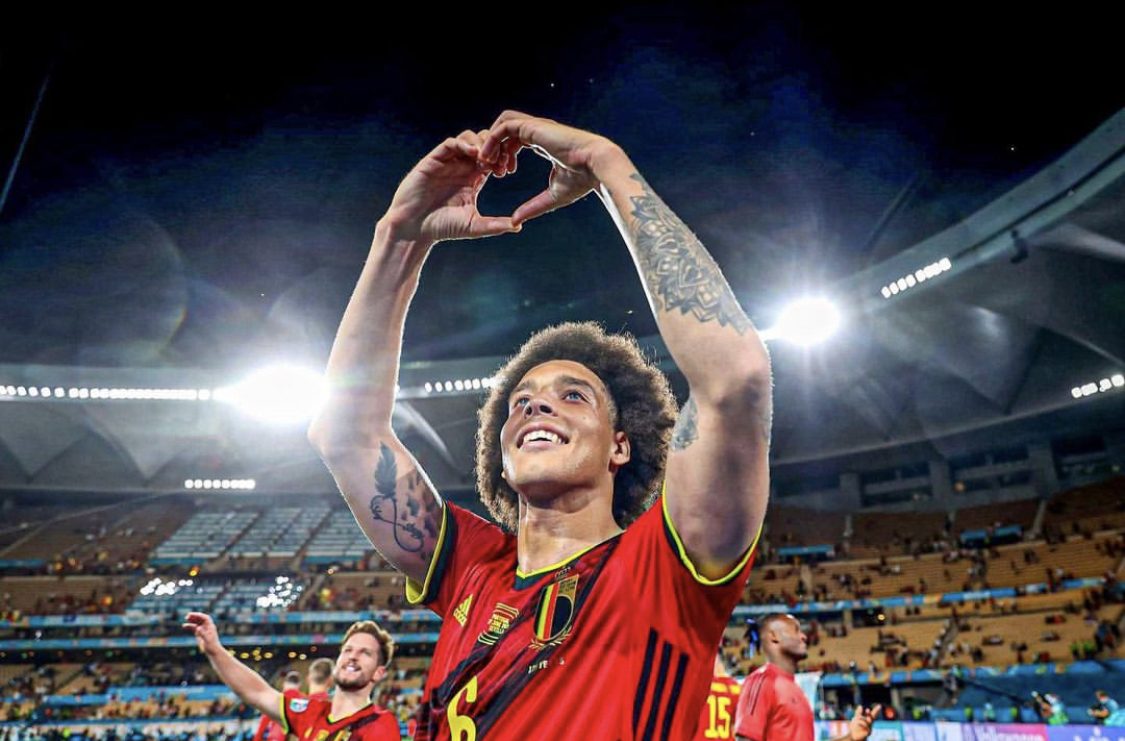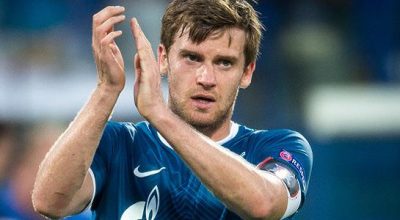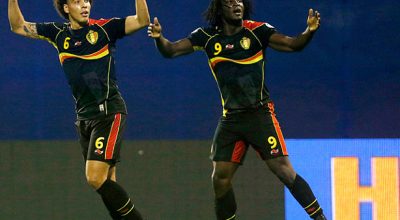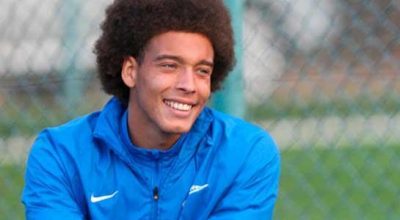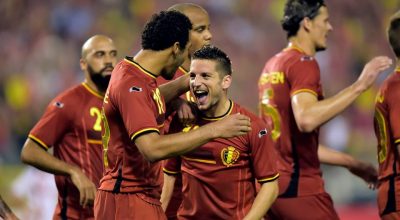On January 22, Thierry Witsel, father of Borussia Dortmund midfielder Axel Witsel, offered the following bleak prognosis for his son’s chances of appearing for Belgium at Euro 2020.
“There is currently zero per cent possibility that he will make it to the Euros,” he said.
Two weeks earlier, Witsel wrote off his club season when he suffered a torn achilles tendon during a 3-1 victory over RB Leipzig. Roberto Martinez, his Belgian national team coach, knew the usual absence for a torn achilles could range between four and seven months.
At 32 years old, Witsel knew this year’s edition would be his last chance of success at a European Championship, while he will be a month short of turning 34 by the time next year’s World Cup finishes. For Martinez, it constituted a grave concern. Witsel, an astute holding midfielder, is the glue that connects Belgium’s defence and midfield, providing a platform for the more expressive talents of Youri Tielemans and Kevin De Bruyne.
It is unsurprising, therefore, that Martinez wished to give Witsel every chance of making the tournament. The Belgium coach said in January: “Axel always has a huge impact on and off the field on the group. With his 110 caps (pre-tournament), he is important. I’m therefore not ruling him out.
“We are making sure that he knows we’re going to wait to the last second before we announce that squad. We will wait until the very last second to try and pick Axel.”
Martinez later explained to ESPN: “There are certain positions where you have two or three players to choose from. Every national team has those — and then you have the players that, in the case of Axel, you can’t replace. You can find other solutions, other partnerships or ways of playing, of course, but in Belgian football, you cannot replace Witsel like-for-like. It’s because of his experience, because of the way he plays, and the incredible balance he gives you.”
It is one thing for a coach to pine for a player’s return, however, and another thing entirely for the player to fully recover. Yet at this summer’s tournament, Martinez’s faith has been repaid. Witsel did not kick a ball for the remainder of Dortmund’s season but travelled with the Belgian squad to Euro 2020 and has, remarkably, reestablished himself as the centrepiece of the team.
Axel Witsel was helped off the pitch at Leipzig’s Red Bull Arena in January.
Belgium’s medical team judged Witsel to be short of fitness to participate in their opening game of the tournament against Russia on June 12. Indeed, as late as May 28, he was still working away from Belgium’s main group, seeking to replicate functional football movements he’d use in match situations.
Yet after 31 minutes as a substitute against Denmark on June 17, he then started and completed back-to-back victories over Finland and Portugal within the space of seven days. The round of 16 success over Portugal on Sunday came in the stifling heat of Seville and on a pitch that appeared to be cutting up at every turn. Both De Bruyne and Eden Hazard exited through injuries. By the end of the game, Witsel’s role became even more challenging as he marshalled a defence seeking to restrain the floating talents of Bruno Fernandes and Joao Felix. Yet he persisted, emerging as one of Belgium’s heroes on the night.
Michael Yormark is the president of Roc Nation, the American sports agency founded by the rapper Jay-Z. It represents Witsel, along with leading Premier League talents such as Marcus Rashford and De Bruyne.
Yormark tells The Athletic: “What he accomplished in coming back from an achilles injury is basically superhuman. To get back within five months; I have not seen this done before and I have been around professional sports my whole life and worked closely with players in the NBA (basketball), NFL (American football) and MLB (baseball).
“I have never seen anything like this. First and foremost, a lot of it is mental toughness, commitment and dedication. I remember speaking to him shortly after the injury and while most people would be down and depressed, he was quite upbeat. This is who he is. He said, ‘Michael, I am going to attack this with everything I have and I am going to make the Euros’. He convinced himself of this straight after the injury and straight after surgery.
“Secondly, of course, the medical care he received was extraordinary. Thirdly, he has always been a fast healer and some athletes genetically heal very fast. This played a part in it but his mental determination drove him every single day during his rehab. If you watched him on Sunday night against Portugal, you walk away saying, ‘How did he do this?’”
Witsel himself is reluctant to attach a “miracle” tag to his recovery, pointing to the fact Belgium team-mate Christian Benteke previously returned from the same injury within five and a half months, yet the speed of Witsel’s return not only to fitness but also forms remains striking.
On the field, the data backs up the eye test.
Statistics show Witsel looks after the ball better than any of the central midfielders to have been involved in three games or more at these Euros. His “turnover rate” of 3.3 per cent — ie, how many times he loses possession per total touches — means you can count on one hand the number of times he has given the ball away. And it’s not as though he does not see much of the ball. Against Finland, for example, only defender Jason Denayer attempted more passes than Witsel in the game.
Witsel also made 15 ball recoveries in that match, while no other Belgium player reached double figures. In the previous knockout round against the defending champions, only Jan Vertonghen completed more passes than Witsel in the Belgium team and after covering more ground (10.8km) against Finland than any of his team-mates, he raised the stakes again by recording an 11.4km distance against Portugal. Only Belgium’s wing-backs, Thomas Meunier and Thorgan Hazard, as well as Witsel’s midfield partner Tielemans, covered more ground than him, and nobody exceeded 11.9km.
For those who have witnessed Witsel at close hand in recent months, the speed of his recovery is not a surprise. Despite his father Thierry initially playing down expectations of a return, the midfielder fixed his mind on a comeback. After surgery in the middle of January, he wrote on social media. “Today I had a successful operation and now I will be working hard to recover day by day, and aim to return stronger than before.”
A report in Belgian newspaper HLN detailed how Witsel’s recuperation began even before that operation, as he continued strength exercises to maintain power in his muscles. The recovery was spearheaded by the Belgian national team medical set-up, where physio Lieven Maesschalck and sports and performance coach Johan Gerets coordinated the response with Borussia Dortmund’s own experts. Witsel did not take a day off, fitting in two — sometimes three — sessions per day, while he also rented an Antwerp apartment close to Maesschalck’s practice, so he could rest or sleep nearby between sessions.
His wife remained with family, two hours by car away in Liege. When he returned to that city between rehab sessions, Witsel would sometimes go to Standard Liege’s academy, where he began his career, to use the facilities and cram extra rehab into his day. Standard’s head coach Mbaye Leye revealed that Witsel organised to be chauffeured around in a mini-van to prevent any extra burden on his legs caused by driving.
Conditioning coach Gerets added: “I have rarely seen someone who could flick the switch so quickly; from being disappointed to a tremendous focus towards the European Championship.”
Martinez acknowledged the psychological challenge, adding: “It’s been a long and lonely five months for him, but if he’s back so quickly, it is because he worked so hard.” Martinez and leading Belgian players regularly checked in on Witsel’s progress, offering encouragement over WhatsApp and including him in conversations about this summer’s tournament.
His representative Yormark continues: “Axel surrounded himself with an incredible team. You have to be mentally and physically tough to do three sessions a day. You have to be willing to endure a lot of pain, because rehab is not easy, but he is a very, very mentally tough individual. I have known him a couple of years and he is positive, upbeat and glass half-full.
“It’s superhuman. Nobody was going to tell Axel, ‘It will take seven months and you will miss the Euros’. Axel set his own timeline and everyone who surrounded him bought into that process. He said, ‘This is when I need to be ready’, and everyone said, ‘OK Axel, we are here to support you and help you in your goal’. It simply became, ‘What do we need to do to get him to the Euros?’
“What he’s done is so inspirational and motivational. Whenever we spoke, it was positive. Messages such as ‘rehab going great’ and ‘I will be ready’. You have to stay motivated, as there will be natural setbacks. You must be mentally tough as every day may not be a great day but he kept his eye on the finish line. I don’t believe doubt or frustration was part of his journey.”
Although Yormark insists Witsel remained optimistic, the player conceded after his return against Denmark that he only fully knew the game was afoot once he sensed the pace of his recovery in May, as he was fully comfortable walking again.
Now into a quarter-final against Italy tonight (Friday) in Munich, Witsel and Belgium are fully up and running.
